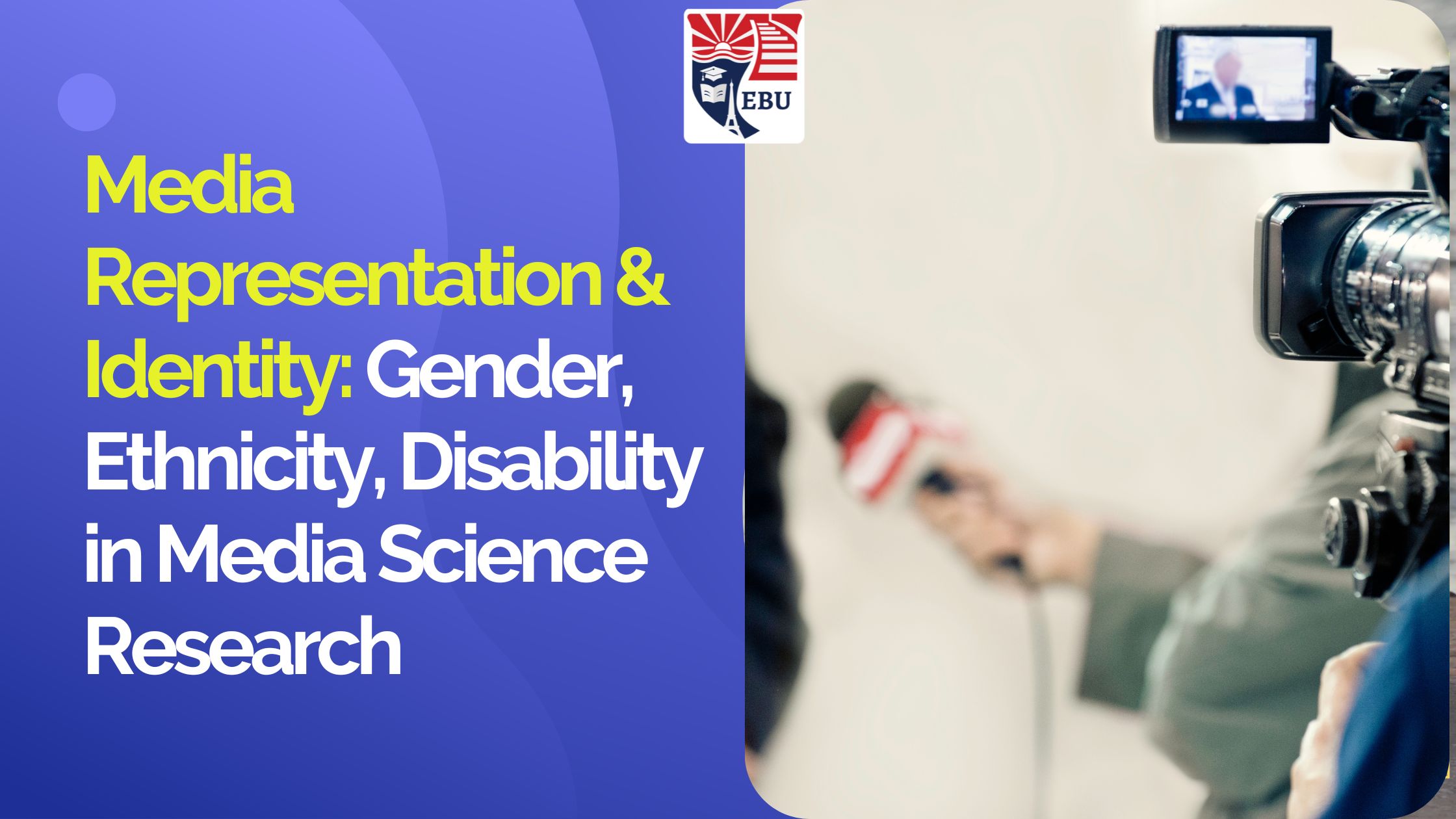In today’s unified world, media has become an influential lens through which we see ourselves and others and how we are seen matters. For Doctorate students in media science, the study of identity in media, with regard to gender, ethnicity and disability - is far from a marginal topic. It lies at the heart of how media shapes culture, updates policy, and influences individual and collective individuality.
The Landscape of Representation
Despite growing awareness and calls for diversity, statistical analyses show that representation remains uneven. For example:
Research by the Annenberg Inclusion Initiative found that only 2.4% of all speaking characters in the 100 top-grossing films of 2015 had a disability.
A recent study on scripted TV series in the US found that just 3.9% of characters had disabilities, with no meaningful trend of improvement over eight years.
On the gender front, the Geena Davis Institute on Gender in Media reported that in 82 family-films released in 2023, female characters comprised only 37.8% of all characters, and only 35.3% of leads were female.
Concerning ethnicity and race, the UCLA Entertainment & Media Research Initiative found progress in racially diverse casting, but actors with disabilities remained clearly under-represented among leads.
These numbers illustrate the pressing need for doctoral research to examine not only how many characters we see, but how they are portrayed — their agency, role, intersectional identities, and the power structures behind those representations.
Why Does It Matter for Media Science Doctoral Research?
The value of focusing on representation in media for doctoral candidates can be framed in three key ways:
1. Identity construction and media influence
Media content helps shape our sense of self and our understanding of others. When certain gender, ethnic or disability identities are consistently marginalised or portrayed stereotypically, media can reinforce social hierarchies and bias. Cutting-edge doctoral work can unpack these processes, asking: How do media narratives contribute to identity formation or exclusion?
Recent machine-learning-based research shows racial minorities appear far less frequently than white counterparts in visual media, and when they do, they are portrayed less prominently.
Such findings suggest that media science research must probe not just representation but visibility, prominence, and quality of representation.
2. Intersectionality and layered identities
Gender, ethnicity and disability do not exist in isolation. A disabled woman from an ethnic minority, for example, may experience multiple layers of under-representation and misrepresentation. Doctorate research that takes an intersectional lens can yield rich insights: How do portrayals differ when identities overlap? What role does disability play when ethnicity and gender are also involved?
The data show, for instance, that white characters are about one-and-a-half times more likely than characters of colour to be portrayed as having a disability in one study.
Such intersectional patterns deserve deeper academic inquiry.
3. Implications for policy, practice and ethics
Media science is not simply expressive, it has normative dimensions. For educational institutions, broadcasters, advertisers and regulators, findings from doctoral research can inform policy on inclusive casting, accessible content, and ethical media production. Research showing that inclusive content reduces racial and gender biases, yet non-inclusive content dominates popular culture, suggests the stakes are high.
Doctorate work at EBU can consequently influence not just scholarship, but institutional practice and global educational commitments.
Areas for Doctorate Study
For researchers, potential themes embrace:
Comparative media systems: How do representation patterns differ across global regions (e.g., Asia, Africa, Latin America) compared with Western markets?
Media genres and under-represented identities: Are certain genres (e.g., children’s programming, advertising, news) more likely to tokenise or ignore disabled characters, women or ethnic minorities?
Behind-the-camera representation: Research shows that while on-screen diversity may improve, senior roles (writers, directors, producers) remain heavily skewed. For example, Black, Asian and Minority Ethnic groups remain under-represented in senior roles in UK television.
Accessibility and disability in media: How do media platforms includes accessibility features (subtitles, audio description) and how often are characters with disability embodied by actors with disabilities (authentic casting)? The lack thereof is documented (e.g., only 21% of characters with disabilities were authentically cast in one U.S. study).
Impact on audiences and identity outcomes: What effect does exposure to inclusive vs non-inclusive media have on self-identity, attitudes toward others, or social inclusion?
Digital and new media spaces: With streaming, social media and online gaming, how is representation evolving (or not)? Many datasets focus on film/TV; Doctorate research can fill gaps in newer media forms.
Bringing Value to the Global Educational Mission
At EBU, our mission is to foster inclusive, impartial and globally applicable education. Media science research that cross-examines gender, ethnicity and disability aligns deeply with this mission. By engaging with these topics, Doctorate candidates will help shape education, media, policy and practice in a way that reflects a truly global and inclusive vision.
Furthermore, such research builds credibility not just for the individual scholar, but for the institution itself, representing that we are committed to rigorous scholarship which matters in society, media industries and global education.
To End With
Representation matters. For Doctorate students entering the field of media science, the study of gender, ethnicity and disability in media isn’t just apt, it is essential. Armed with stats, theoretical frameworks and a clear commitment to inclusion, your research can contribute to more equitable media landscapes and deepen our understanding of identity, media narratives and societal change with an Applied Doctorate in Media Science, Doctorate Degree in Media Science. In doing so, you play a part in shaping a future where every individual - regardless of gender, ethnicity or ability - is seen, heard and appreciated.
Written By : Philip Campbell




